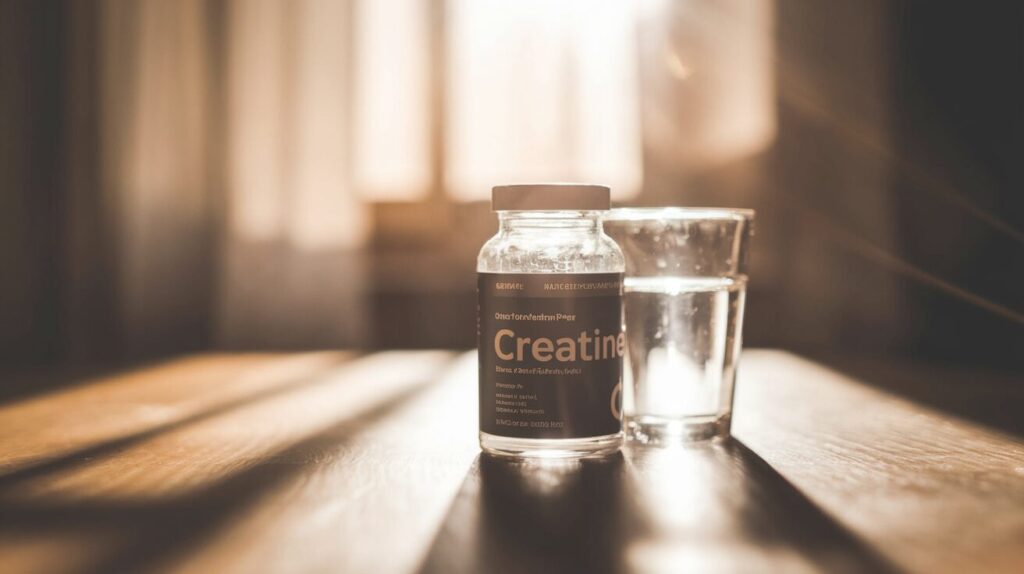Creatine is one of the most studied dietary supplements in the athletic community, known for its ability to enhance physical performance and support recovery. This article provides a comprehensive overview of creatine’s benefits, potential risks, and considerations for its use, helping athletes and fitness enthusiasts make informed decisions about supplementation. By exploring the advantages of creatine, while also addressing important safety concerns and proper product selection, readers will gain valuable insights to optimize their training outcomes.
Table of Contents
Benefits of Creatine for Athletic Performance
Creatine has emerged as one of the most popular dietary supplements among athletes and fitness enthusiasts, known for its ability to enhance physical performance. This natural compound, found primarily in red meat and fish, plays a significant role in energy production during high-intensity, short-duration activities such as sprinting and weightlifting. In this section, we will delve deep into the various benefits of creatine for athletic performance, highlighting how it can impact both strength and endurance.
1. Enhanced Energy Production
At the core of creatine’s effectiveness is its role in the adenine triphosphate (ATP) energy system. ATP is the primary energy carrier in the body, and during short bursts of intense physical activity, demand for ATP skyrockets. Creatine supplementation increases the availability of phosphocreatine, a stored form of creatine in muscles that aids in regenerating ATP. This can lead to improved performance during high-intensity activities, enabling athletes to train harder and longer.
2. Improved Strength and Power
Numerous studies suggest that creatine supplementation can significantly enhance strength gains. A study published in the Journal of Sports Medicine found that participants who supplemented with creatine experienced greater increases in strength compared to those who did not. This is particularly beneficial for sports that require quick, explosive movements such as weightlifting, sprinting, and competitive sports like football and basketball.
3. Increased Muscle Mass
One of the more noticeable benefits of creatine is its impact on muscle mass. Creatine supplementation often leads to an increase in muscle water retention, making muscles appear fuller and larger. Moreover, by allowing users to lift heavier weights and perform more repetitions, creatine indirectly supports muscle growth through increased mechanical tension and metabolic stress, two key factors in muscle hypertrophy. Research suggests that the combination of creatine supplementation and resistance training can lead to significant increases in lean muscle mass.
4. Enhanced Recovery
Recovery is crucial for athletic performance, and several studies have indicated that creatine may also aid in recovery after intense exercise. It has been shown to reduce muscle cell damage and inflammation, leading to quicker recovery times. This is particularly beneficial for athletes who train frequently or at high intensities, as shorter recovery times can lead to more effective training sessions. The ability of creatine to improve the recovery process enables athletes to maintain a consistent training regimen, fostering greater long-term improvements in performance.
5. Potential for Improved Endurance
While creatine is often associated with power and strength, emerging research indicates that it may also have benefits for endurance athletes. Although not traditionally viewed as an endurance supplement, creatine can improve recovery between repeated bouts of high-intensity exercise, which can indirectly enhance endurance performance. For endurance athletes, this means potentially better pacing during races and improved performance in sports that incorporate intermittent high-intensity efforts.
6. Cognitive Benefits
Interestingly, recent studies suggest that creatine may not only boost physical performance but could also have cognitive benefits, particularly under fatigue. Athletes often face cognitive challenges during competitions, and creatine has been shown to improve cognitive performance, reaction times, and decision-making skills when under physical stress. This dual benefit, enhancing both physical and mental performance, can be particularly valuable in competitive sports.
Conclusion
With its myriad benefits ranging from enhanced energy production and improved strength to faster recovery and potential cognitive gains, creatine stands out as an effective supplement for athletes. Making the choice to incorporate creatine can lead to significant improvements in athletic performance, making it a staple in many training regimens. In the following section, we will explore the risks associated with creatine supplementation, ensuring athletes are well-informed before making any decisions.
Understanding the Risks of Creatine Supplementation
While creatine is among the most studied and popular dietary supplements for athletes and fitness enthusiasts, it’s essential to understand the potential risks associated with its use. Creatine supplementation can offer various benefits, but it also comes with risks that may affect certain individuals differently. This section dives deep into the various health concerns, side effects, and considerations linked to creatine use.
Potential Side Effects of Creatine
Creatine is widely regarded as safe for most healthy individuals, but some may experience side effects. Common side effects include:
- Gastrointestinal Distress: Some users report stomach cramps, diarrhea, or nausea, particularly when taking high doses without adequate hydration.
- Mild Dehydration: Creatine’s mechanism involves drawing water into muscle cells, which could lead to dehydration if fluid intake is insufficient. Staying adequately hydrated is crucial while using creatine.
- Weight Gain: Creatine can cause rapid weight gain due to increased water retention in muscle tissues. While this weight gain is typically from lean mass, it can be concerning for athletes in weight-class sports.
- Muscle Cramps: Although evidence is mixed, some individuals may experience muscle cramps when using creatine, particularly if they do not hydrate properly.
Long-term Health Risks
The long-term safety of creatine supplementation has been studied, with most research indicating it is safe for up to five years of continuous use in healthy individuals. However, specific populations should exercise caution:
- Kidney Function: Concerns have been raised about creatine’s effect on kidney function, particularly in individuals with pre-existing kidney conditions. While healthy individuals typically do not experience adverse effects, those with kidney issues should avoid creatine or consult a healthcare provider first.
- Potential for Drug Interactions: Creatine can interact with certain medications, particularly those affecting kidney function. If on such medications, discuss with a healthcare provider whether creatine supplementation is appropriate.
- Underlying Health Conditions: Individuals with conditions such as diabetes, liver disease, or hypertension should approach creatine supplementation cautiously, seeking professional advice before starting.
Monitoring and Managing Risks
To manage the risks associated with creatine supplementation effectively, consider the following:
- Start with Lower Doses: Beginners should start with lower doses, typically 3-5 grams per day, to assess tolerance before ramping up to higher doses.
- Stay Hydrated: Increased fluid intake can help mitigate the risk of dehydration and minimize gastrointestinal discomfort.
- Consult Healthcare Professionals: Before beginning any supplementation, especially with pre-existing conditions, individuals should consult a healthcare provider to ensure safety and appropriateness.
The Importance of Individualization in Supplementation
Every individual is unique, which makes it essential to consider personal health needs and fitness goals when deciding on creatine supplementation. Factors such as age, activity level, existing health conditions, and dietary intake play significant roles in determining whether creatine is suitable. Personalized training approaches and nutrient considerations can support the best outcomes while minimizing risks.
Choosing the Right Creatine Product for Your Needs
With a plethora of creatine supplements available on the market, choosing the right product can be overwhelming. Creatine, widely recognized for its ability to enhance athletic performance, comes in various forms and compositions. This guide will help you navigate the selection process to find a creatine product that suits your individual needs.
Understanding Different Types of Creatine
Various forms of creatine are available, each with unique properties. Understanding these differences can help you select the most appropriate product:
- Creatine Monohydrate: The most researched and commonly used form, it effectively increases strength and muscle mass. It’s typically the first choice for those new to supplementation.
- Creatine Ethyl Ester: This variant claims better absorption and reduced water retention. However, scientific consensus on its effectiveness is lacking.
- Buffered Creatine (Kre-Alkalyn): Designed to be more stable and less acidic, Kre-Alkalyn is marketed as having fewer side effects, though research is limited.
- Creatine Hydrochloride: Known for its solubility, some users prefer it for fewer gastrointestinal issues and enhanced absorption.
Assessing Your Goals and Lifestyle
Your specific fitness goals and lifestyle can significantly influence your choice of creatine. Consider the following:
- Goals: If your aim is to increase strength and muscle mass, creatine monohydrate is typically recommended due to its extensive research-backed efficacy.
- Dietary Preferences: If you follow a vegan or vegetarian diet, ensure the creatine product is free from animal-derived components. Many brands offer vegan options.
- Convenience: If you are often on the go, powders might not be as convenient as capsules or ready-to-drink formulas, which offer portability and convenience.
Ingredients to Look For
Choosing a creatine product goes beyond just the type of creatine; scrutinizing the ingredient list is crucial. Here are some components you might encounter:
- Additives: Look for products free from unnecessary fillers, sugars, or artificial colors that could compromise quality.
- Additional Ingredients: Some products include performance enhancers like Beta-Alanine or BCAAs. If your goal is muscle recovery or endurance, these combinations might be beneficial.
- Quality Certifications: Opt for brands that offer third-party testing and certifications. This ensures you are consuming a product that meets quality and safety standards.
Price vs. Value
While it may be tempting to choose cheaper options, remember that quality often correlates with price. Evaluate products on a cost-per-serving basis rather than solely on the total price. A slightly higher-priced supplement could provide better quality and results, ultimately offering more value.
Reputable Brands and Reviews
Identifying reputable brands through customer reviews can also aid in your decision. Look for companies with:
- Transparency: Brands that openly share ingredient sourcing and manufacturing practices build trust.
- Positive Feedback: Research customer testimonials and professional athlete endorsements, as these may indicate product efficacy.
- Research and Education: Brands that provide scientific information about their products and their effects on performance show a commitment to customer education.
Furthermore, websites like flexmeup.com often offer reliable reviews and comparisons of different creatine products, helping you make an informed decision.
Conclusion
In summary, selecting the right creatine product involves understanding different types, assessing personal goals, and scrutinizing product ingredients and brand reputation. By considering these factors, you can ensure that your choice supports your fitness journey effectively.
Who Should Consider Creatine and Who Should Avoid It
Creatine is a widely studied supplement, especially among athletes and those seeking to enhance physical performance. However, understanding who should consider using creatine and who should avoid it is essential for making informed choices. Below, we delve into various populations, thoroughly examining the scenarios in which creatine supplementation may be beneficial or detrimental.
Who Should Consider Creatine?
Creatine supplementation is often suitable for specific groups of individuals based on their health goals and performance aspirations. Here’s a detailed look at who can potentially benefit:
- Athletes in High-Intensity Sports:
Individuals involved in sports requiring bursts of speed and power, such as sprinting, weightlifting, and football, can substantially benefit from creatine. Research shows that it can enhance strength, improve muscle mass, and boost athletic performance in these domains. - Bodybuilders and Strength Trainers:
For those focused on developing muscle size and strength, creatine can promote muscle hypertrophy and improve overall training output. It’s known to aid in recovery times between sets, allowing for more intense workouts. - Individuals Aged 50 and Older:
Research indicates that older adults can experience cognitive and muscular enhancements with creatine supplementation. It may help counteract age-related muscle loss (sarcopenia) and support cognitive health. - Vegetarians and Vegans:
Since creatine is predominantly found in animal products, individuals following vegetarian or vegan diets could have lower natural creatine stores. Supplementation may provide significant benefits in physical performance and cognitive function for this group. - People Engaged in Intense Training Regimens:
If you’re involved in high-frequency training cycles, creatine can help with recovery and performance consistency by replenishing creatine stores that diminish after intense workouts.
Who Should Avoid Creatine?
While creatine has many benefits, it is not universally advisable for everyone. Here are groups that should exercise caution or entirely avoid creatine supplementation:
- Individuals with Kidney Conditions:
Those with pre-existing kidney problems should avoid creatine, as high doses could exacerbate kidney function and stress the organ further. - Individuals with Diabetes:
Since creatine may affect insulin sensitivity, people with diabetes or metabolic disorders should consult healthcare professionals before starting supplementation. - Pregnant or Breastfeeding Women:
Due to the lack of comprehensive research on the effects of creatine during pregnancy and lactation, it’s generally recommended that this group avoid supplementation until more evidence is available. - Individuals Prone to Dehydration:
Creatine may increase fluid retention, potentially leading to dehydration during strenuous activities. Those who frequently experience dehydration should approach creatine with caution. - Anyone with Allergies to Creatine Ingredients:
If you’re sensitive or allergic to components present in certain creatine products, it’s best to avoid these supplements entirely to prevent adverse reactions.
In summary, while creatine can offer a plethora of benefits to specific demographic groups, it is crucial for individuals to assess their unique health circumstances. For personalized health advice, consulting a healthcare professional is always recommended.
Creatine is a popular dietary supplement among athletes due to its proven benefits in enhancing athletic performance, including increased energy production, improved strength and muscle mass, and faster recovery times. It is particularly effective for high-intensity sports like weightlifting and sprinting. Additionally, creatine may offer cognitive benefits, especially under physical stress, making it valuable for competitive sports. However, individuals with kidney issues, diabetes, or those who are pregnant should avoid supplementation.
When selecting a creatine product, consider various types like creatine monohydrate for beginners, and check ingredients for quality and any unnecessary additives. It’s crucial to evaluate your specific fitness goals, dietary preferences, and consult with a healthcare professional if you have existing health concerns before beginning supplementation. Staying hydrated and starting with lower doses can help mitigate potential side effects.













